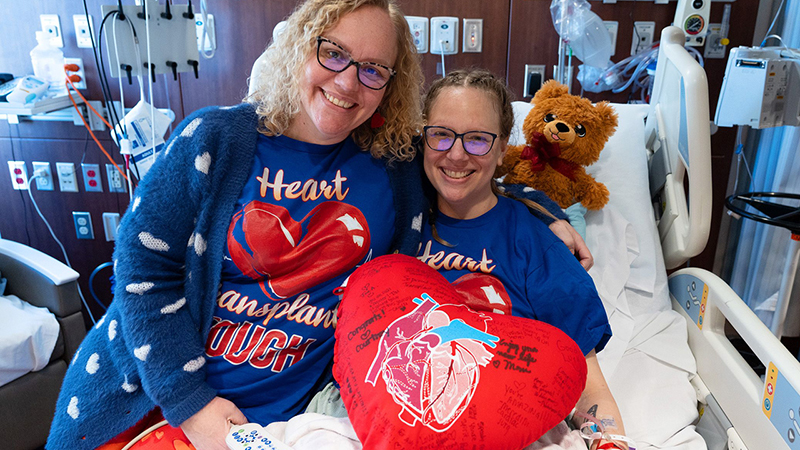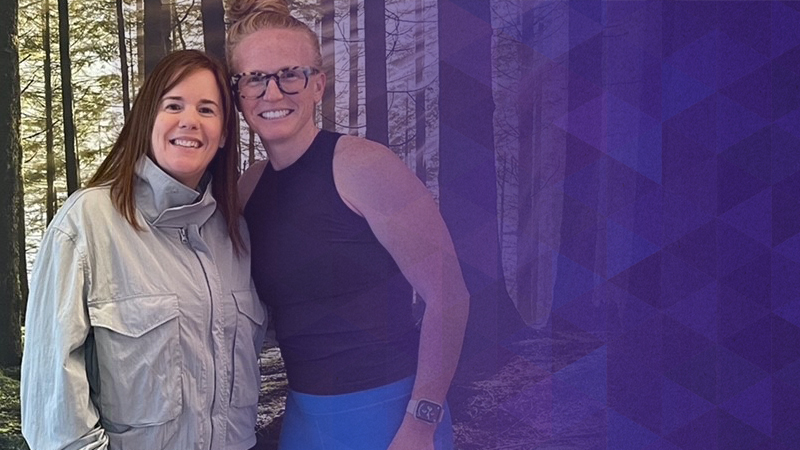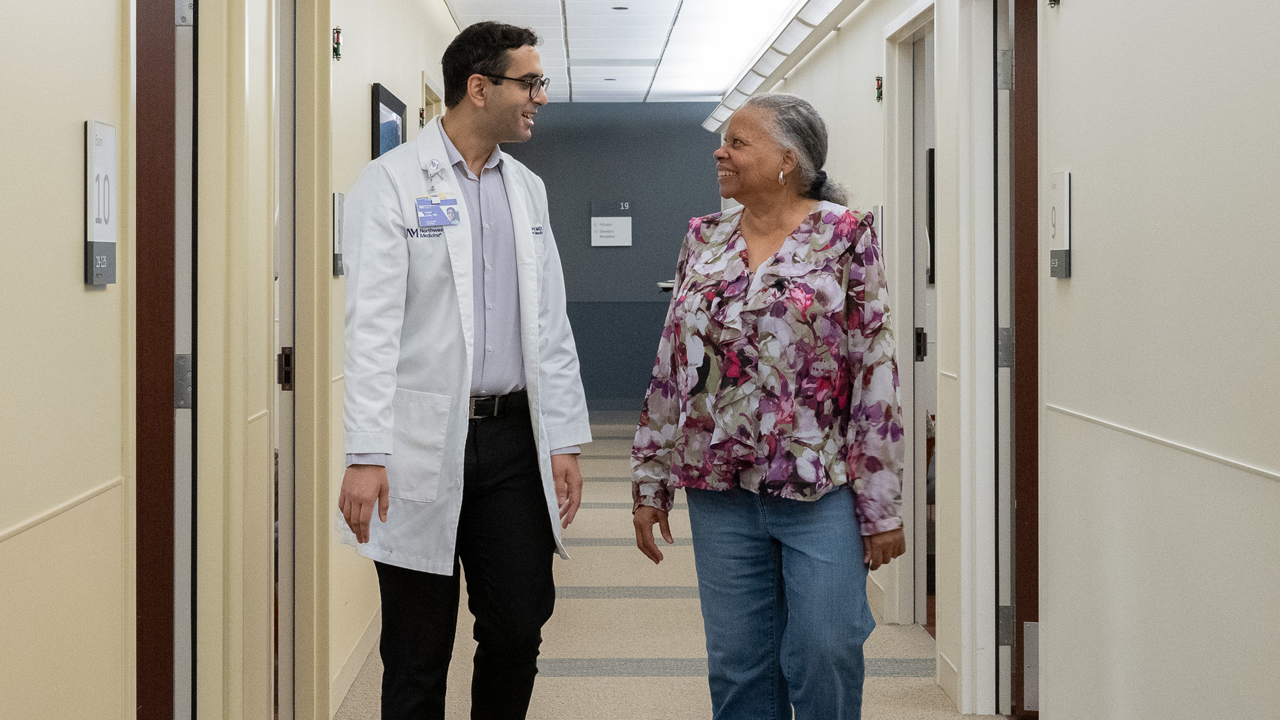Making History: Living With a Disability
Challenging Stigma and Following Passion at Northwestern Medicine
Updated December 2021
 Kim Pedersen
Kim Pedersen
Patient Support Services
Northwestern Medicine Marianjoy Rehabilitation Hospital
Pedersen serves as the director of Patient Relations at Marianjoy Rehabilitation Hospital. She has a tracheal tube, which enters the windpipe through the front of the neck to allow more air into the lungs. A tracheostomy can be a temporary or permanent medical procedure, depending on a patient’s health condition. For Pedersen, her tracheostomy is permanent; it was inserted to improve her quality of life after she had thyroid cancer. Her story is about perspective, education and having a sense of humor.
What do you love about your job?
I am blessed to be able to connect with patients and families in my role. At the center of my work are patients going through the toughest time of their lives. I never want patients to feel like they don’t know what’s happening next, because I’ve been there, and it is very scary. Having had 15 surgeries in my life, I know how it feels to be very vulnerable.
Getting a permanent tracheal tube was a very hard decision, but the minute I got the procedure, I could breathe again. This experience definitely shaped my desire to work in health care. I also have four daughters, who are all in jobs that serve others — one is a special education teacher and the other three are in health care — so maybe I have been a role model for them, too.
What are some creative solutions you’ve developed to address problems in your career?
I’ve had past employers ask me if I was going to be sick a lot, if I would have trouble talking or if I would hold them liable if I got an infection. You start to lose some confidence when you think people are not looking at your abilities or discussing your work history in an employment environment. I’ve had to fight hard to overcome that. Whenever possible, I educate people about it, answer their questions and laugh about something silly they’ve said.
What are you most proud of?
I am proud of myself for using the resources here that connect me with really powerful women in business who have served as mentors throughout my career. I’ve also taken advantage of educational opportunities. When I first came out of high school, I had to have a lot of surgeries due to my thyroid cancer. I couldn’t go to college right away and had an emergency tracheostomy. I got derailed, but ended up going back to school, and recently, I earned my master’s degree. I think my family and kids are very proud of me for continuing my education, and hopefully I can inspire other people, too. I never want anyone to quit on themselves or to say they can’t.
What does your identity as someone living with a disability mean to you?
I identify as a woman who wants to be the best she can be, no matter the circumstances. When I first got the tracheostomy, I did a lot of, “God, why me?” Coming to work at Marianjoy was the eye-opener I needed. When I see what other people face in terms of adversity, I am reminded that my tracheostomy shouldn’t stop me. The reality is that having a disability has made me a more empathetic and caring person who looks at the blessings of life.
What is an assumption people often make about you, based on your disability, that you love to dispel?
I verge on having an “invisible disability,” fighting against perceptions of how I’m speaking because people don’t notice my tracheal tube right away. Once they realize, people have a perception that I am terminally ill because of the way the media portray a tracheal tube.
I would rather people ask me about my tracheal tube because once I educate them, they can then focus on what I can bring to the table rather than my limitation. If you feel comfortable, ask me directly what you are curious about. I’d love to tell you, and this would help me feel less isolated.
Those who work with me know me and fortunately have looked past it. I’ve had colleagues from past jobs, outside of Northwestern Medicine, lean into my neck to talk to me. I’ve said to them, “I have ears. Why are you leaning into my neck?” Again, you have to laugh. Having humor and educating people is how I can redirect them to my abilities.
 Molly Schoblocher
Molly Schoblocher
Emergency Management
Northwestern Medicine Lake Forest Hospital
Schoblocher is an emergency manager at Lake Forest Hospital, a role she has held since July 2018. Before and during her time at Northwestern Medicine, she has had multiple sclerosis (MS). Affecting roughly 400,000 people in the U.S., MS is a chronic disease of the central nervous system that affects communication between the brain and body. Her story is about dedication and an ability to adapt.
What do you love about your job?
Over the last eight months, my team and I have been front and center with COVID-19 response amid civil unrest, power outages and some weather issues. We’ve been tasked with bringing everyone to the table and responding to various emergencies. The best part of my job is that I can never fully anticipate what will come next, so my day-to-day is never the same.
When my initial diagnosis came in June 2008 (as a patient at Northwestern Medicine), my providers told me my future capabilities with MS would be more telling in the next 10 years. Exactly 10 years later, I got a job offer at Northwestern Medicine, which was very satisfying to me. I feel it is a great way to give back, and I love contributing to an organization that got me back on my feet.
How are you making a difference?
I am training clinical staff and other staff to respond to emergencies and coordinate decontamination of the Emergency Department. The way I look at it is, when an emergency happens, it rests on me to make sure all people have the tools they need to go home safely at the end of the day. We are more of the behind-the-scenes people, but we are making sure everyone else has the right tools to proceed with their life-changing work.
What does your identity as someone living with a disability mean to you?
It’s one of those things that you don’t want to be at the forefront, but you also like other people to understand what you are dealing with, even if they can’t see it. If you can’t see it, it doesn’t mean that there’s nothing wrong. I hope everyone can be more understanding of where people may be coming from and offer a little bit of grace at times.
What is an assumption people often make about you, based on your disability, that you love to dispel?
Sometimes people will hear you have MS, and you can see their wheels turning: They think I’m going to die. However, I am probably going to live just as long as anyone else. I go back and forth between, “I don’t want you to look at me like I’m broken,” and, “Please give me some grace because I’m experiencing some symptoms that are affecting my ability to do my job today.”
My symptoms of MS tend to ramp up and come back down again. These range from double vision (causing me to wear a patch over one eye) and sensitivity to heat, to right-sided limitations like numbness and tingling. Day to day, I mostly deal with fatigue. As with a non-disabled person, some days are not my best days, but I am capable. Above all else, I would like to help people understand that I am not a liability.
What do you like most about what NM provides to create an inclusive environment?
I really like the fact that Northwestern Medicine has an NM Champion Network for employees because I think it can be very hard for someone with any disease, associated with any level of stigma, to feel like they belong. The NM Champion Network’s Disability Chapter gives people the voice and educational platform to be able to make sure anyone new coming on staff has support. It’s a phenomenal group of accepting and understanding people on your side.
 Amanda Fowler Balsan
Amanda Fowler Balsan
Marketing
Northwestern Medicine Marianjoy Rehabilitation Hospital
Since 2012, Fowler Balsan has worked as a marketing specialist at Marianjoy Rehabilitation Hospital. She has also been a patient at Northwestern Medicine, where she recovered from not one, but two separate traumatic brain injuries from car accidents, one as a passenger and one where she was rear-ended as a driver. Her first injury was in 2005, when Fowler Balsan had to be extricated from the car, and her family was told she had less than a 5 percent chance of survival. The second accident, also severe, was 11 years later on November 21, 2016, while she was an employee at Northwestern Medicine. Fowler Balsan has had to relearn how to do many things: walk, talk, swallow, balance, even see. She still has some existing limitations, including issues with circulation and weakness on her left side, as well as slight memory challenges. Her story is one of resilience, purpose and passion.
What do you love about your job?
Where do I start? From the perspective of a former patient at Marianjoy, I know what it means to be supported by this group of providers, and I love promoting their work. In my role, I get to not only use my skills in writing, analysis and communication, but also pursue my passion for health care. At this organization, it’s not just about saving patients’ lives: it’s about helping them get their lives back.
What are you most proud of?
I’m most proud of how I’ve incorporated my disability into my life. It’s a wonderful part of my identity and my purpose. I’ve also found great coping mechanisms, including note-taking to support my memory, so that I can partner with and celebrate my disability.
What do you like most about what NM provides to create an inclusive environment?
One of the things I love about Northwestern Medicine is they embrace not just your skills, but your experience and personality. Their staff is full of vibrant people, not automatons. Each person’s story contributes to their passion and skill in saving and improving patients’ lives. Northwestern Medicine has helped me view my disability as an asset, not as a detriment. Whenever possible, I am given the opportunity to share my experience with disability in a way that may help patients, whether it’s giving my opinion on the accessibility of something, or how to ensure messaging tone is encouraging, not condescending. I have grown so much during my employment here; they don’t let fear of my disability hold me back, and neither do I.
Coming back to work after my second injury, I felt even more loyal to Northwestern Medicine. Though I had suffered a concussion and was very banged up, I was anxious to get back to work. However, my team encouraged me to come back gradually, sent me enormous bouquets when I was in recovery, and had systems in place to help me get back into the swing of things when I was ready. For a large organization, they do the small things to show how much they care. And big thanks to my boss at the time, Sarah Mahisekar at Marianjoy, for her support, empathy and patience with me along the way. I am also grateful for the rest of my Marketing team and current leader, Laura Schmidt, for how much they’ve helped me grow.
What is something you would like people to know about how to contribute to your experience of belonging?
I never want anyone to be afraid to ask me questions about my disability. People should know more about disability so they know how to interact with others. With one of five people in the U.S. living with a disability at some point in their life, awareness is important. Please ask. I’d love to tell you my story.
I also want people to know that just like anyone else, some days are better than others. I’ve learned to be more compassionate and patient, myself, through my disability experience. I hope that by sharing stories of disability, especially hidden disability like a traumatic brain injury, that everyone can learn the importance of compassion. You never know what someone is going through, or has been through.
What is an assumption people often make about you, based on your disability, that you love to dispel?
When people hear about my severe traumatic brain injury, they feel bad for me. While I appreciate their sympathy, I want people to know that this is one of the best things that has ever happened to me: It gave me so much purpose, direction and passion. It wasn’t until my first accident that I knew I wanted to work in health care and champion disability awareness. I am so happy I’ve been able to affect lives and ended up where I am today.







